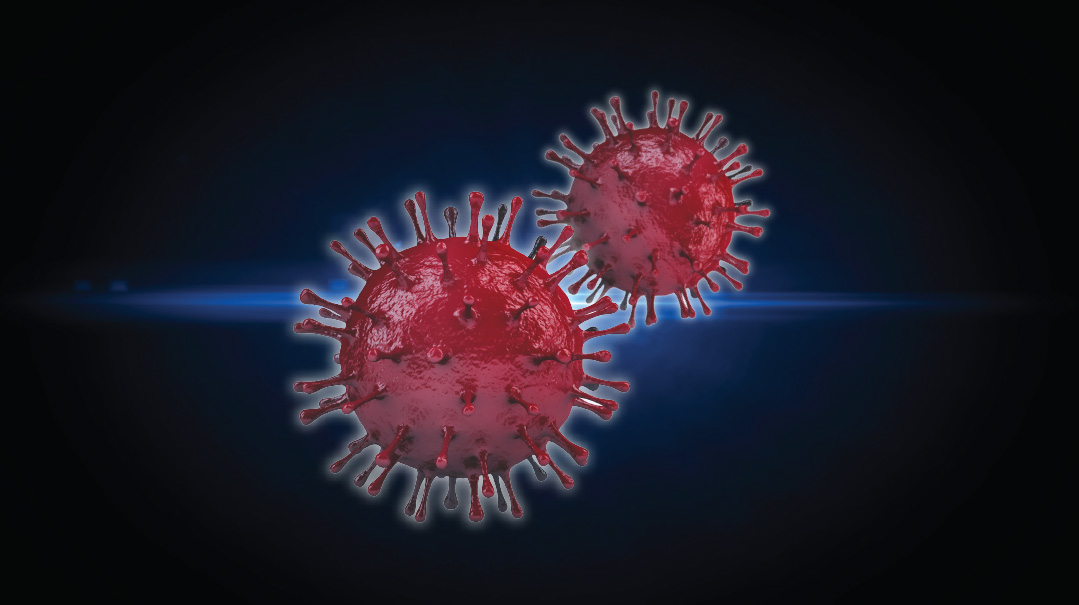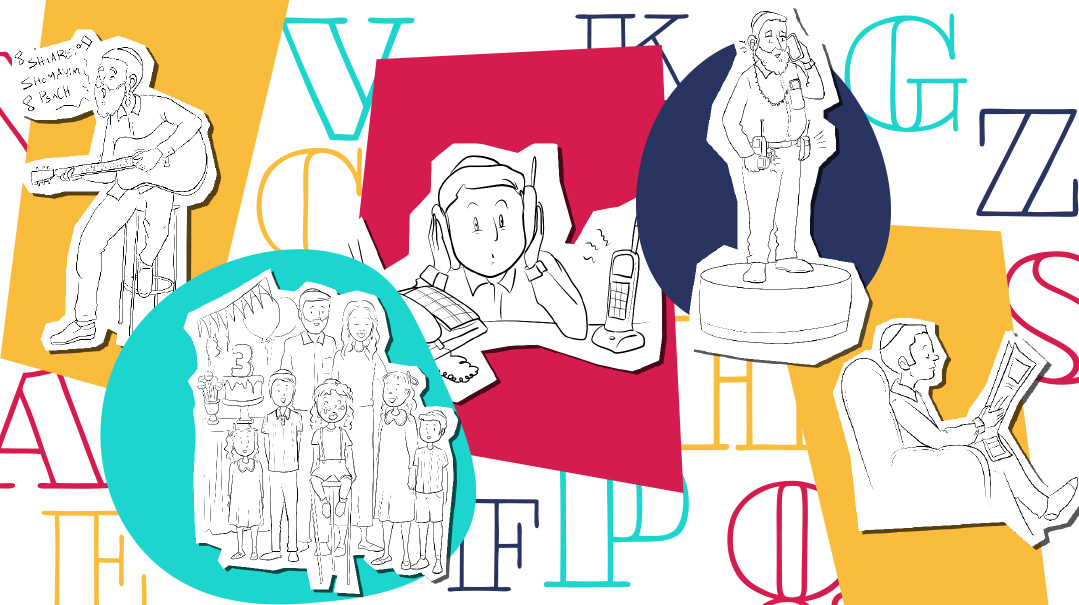Long Covid

Is there realistic help for “long Covid victims,” or are they destined to continue stumbling through their days in a haze?

While Covid is just an unpleasant memory for some, others continue suffering from symptoms such as extreme fatigue, shortness of breath, brain fog, abdominal pain, heart palpitations and other debilitating ailments for months after the disease has officially disappeared. Is there realistic help for these “long Covid victims,” or are they destined to continue stumbling through their days in a haze?
Thirty-eight year old Adina Blum* from New Milford, New Jersey, definitely didn’t find COVID-19 pleasant, but it wasn’t horrific, either. At the end of March 2020, she caught Covid from a coworker and tested positive five days after the onset of symptoms.
“I had no fever, just aches, fatigue, a runny nose and cough, and shortness of breath,” she says. She lost her sense of smell and taste and was under the weather for three or four weeks.
She tried returning to work a month later, at the end of April, but after just one day on the job, she felt awful and achy all over. When the symptoms persisted, she was forced to take medical leave from her job. Her school-age children were home, and her husband, who works in the medical field, wasn’t usually available, so she didn’t get much respite. Adina found herself deeply exhausted and suffering from brain fog and neuropathy (tingling and shooting pains in the feet). A doctor ran blood tests and found her liver enzyme levels had shot way up, although an ultrasound of the liver didn’t find any abnormalities. By June she’d consulted a neurologist for the disturbing brain fog and neuropathy.
“At the beginning, you feel you must be going crazy,” Adina says. “But these symptoms are very real.”
A nurse by profession, she works at Mount Sinai Hospital, which has a clinic for “long Covid” sufferers. She booked herself an appointment, and providers there gave her medication for the neuropathy, the brain fog, and the increased anxiety she felt.
“It was very validating to speak to the doctors there, and to join social media groups for people dealing with the same symptoms,” she says.
By the fall she was starting to feel better, although taking the Covid vaccine in December and January temporarily exacerbated her symptoms again. Last summer, when she caught the Delta variant, her body aches returned with abdominal pain and heart palpitations, and she was put on steroids for severe trigeminal nerve pain. Her elevated anxiety levels have persisted over the past two years, and are aggravated when she can’t find a word or feels her brain is abnormally slow. She still takes medication for the anxiety and brain fog.
“I feel like I traded my health for a pillbox,” she says. “I’m 38 years old, and I take nine pills every day.”
While she feels somewhat more functional this summer, two years later, she’s still abnormally tired: “By four o’clock every day, I need to collapse for a while.”
Adina’s story is far from unique. When one of my own adult children began complaining of constant fatigue and aches, even after sleeping ten or twelve hours, I privately worried that maybe she was depressed. She thought maybe she had mono. After going through blood work and ruling out mono and other possibilities, her doctor diagnosed long Covid (she’d had Covid twice, albeit relatively mild cases).
She’s slowly getting better, but the condition makes it a challenge to take care of her young children, and she’s frustrated that she still needs so many hours of rest and can never overwork without suffering a setback.
“I used to be the Energizer Bunny” claims Chani, a nurse. “I worked, I was involved with my community, I took care of my family. Now I constantly feel like I’m not a good enough wife and a bad mother. I’m just no fun anymore, I have no energy. I can’t go to simchahs anymore because they’re too noisy. It took me a week to recover from a recent simchah. I don’t drive long distances because I’m afraid I’ll suddenly feel too weak. I can only work on a very part time basis.
“I look fine on the outside, but I can barely make it to the end of the day.”
Most of us assumed that when our bouts of Covid passed, we were done for good. But the reality is that millions of people develop symptoms, some of them quite serious, that last many months after they’ve supposedly recovered from the disease.
Dr. Ari Ciment, a pulmonary and critical care specialist at Mount Sinai Medical Center in Miami Beach, says the problem is so big that the federal government has allocated $1.5 billion for research into the causes and cures of long Covid. He himself treated Miami’s first COVID-19 cases — hundreds, then thousands of people.
“It’s estimated that 40 to 50 percent of adults in the US caught COVID-19, and since then, even though now we have milder forms of the virus, 100,000 new cases are diagnosed every day,” he says. “If 20 percent of these patients develop long Covid, we’re talking millions of adults who may suffer from it.”
The medical establishment has stepped up to the plate by opening clinics dedicated to long Covid in many hospitals. Mount Sinai Hospital in New York offered one of the first, but almost every state now has one. A website dedicated to helping long Covid patients, www.survivorcorps.com, offers maps that direct patients to the nearest clinic, both in the US and internationally, as well as other resources and recent research findings.
Long Covid symptoms don’t seem to be correlated with how symptomatic the actual viral infection was. Across the board, doctors are finding that many people who’d had only mild cases of Covid are suffering long-term symptoms, sometimes severe ones, even though later tests don’t show any pathologies.
The official definition of long Covid, created by the World Health Organization, reads as follows: “Post COVID-19 condition occurs in individuals with a history of probable or confirmed SARS CoV-2 infection, usually three months from the onset of COVID-19 with symptoms that last for at least two months and cannot be explained by an alternative diagnosis.
“Common symptoms include fatigue, shortness of breath, cognitive dysfunction, but also others, and generally have an impact on everyday functioning. Symptoms may be new onset following initial recovery from an acute COVID-19 episode or persist from the initial illness. Symptoms may also fluctuate or relapse over time.”
For both patients and doctors, long Covid has been confusing and frustrating to deal with. As many as 200 different symptoms have been reported, and it affects up to ten different organ systems, including the lungs, brain, heart, liver, and stomach. It seems to particularly affect adults in their thirties, forties, and fifties, with women reporting symptoms more frequently than men.
“Long Covid became a sort of wastebasket term for any symptoms that appeared in people after they’d had Covid,” Dr. Ciment says. “It’s definitely not one-size-fits-all.”
Similar long haul symptoms have been reported for other respiratory viruses such as SARS (Severe Acute Respiratory Syndrome) and MERS (Middle Eastern Respiratory Syndrome). But we don’t have much data for those diseases because the number of people who became sick is so much smaller. Symptoms fall into three broad categories: neuropsychiatric (brain fog, memory loss, neuropathy, etc.); respiratory (shortness of breath, coughing); and musculoskeletal (fatigue, aches).
But Dr. Ciment adds yet more symptoms to that list. Some people experience gastrointestinal symptoms; others develop rashes. The endocrine system may be affected — i.e., the thyroid and pancreas (possibly resulting in diabetes). The circulatory system may be affected, with the appearance of both macrovascular clots and microvascular inflammation. Women’s monthly hormonal cycles may be affected as well; one of Dr. Ciment’s patients developed severe bleeding that caused symptomatic anemia.
Baruch,* a bochur on the West Coast in his early twenties, developed stomach attacks, encephalitis, and an inflamed liver, as well as headaches, brain fog, and shaking. Raizy* told Mishpacha she developed severe tinnitus and asthma-type wheezing during any exertion.
And we’re not done. Bracha from Amsterdam relates that in addition to the usual fatigue, weakness, and brain fog, she has insomnia and strange or nightmarish dreams, and is therefore always tired.
“It feels like your battery is finished, but the charger isn’t working,” she says.
She often feels feverish, shaky, and dizzy, and loses her voice at the end of the day. Her stomach can be capricious, and strong lights and loud music bother her.
According to Ephraim Sherman, a DNP (doctor of nursing practice) currently working in a neurology practice in Albany, many long Covid complaints can be compared to fibromyalgia, which is a diagnosis given for unexplained fatigue and muscle pain.
“Long Covid is a diagnosis for symptoms we can’t explain,” he says. “It’s possible that fibromyalgia has always been due to lasting damage after a common cold or flu, and in the same way, long Covid is due to the damage the SARS-CoV-2 virus leaves in its wake. People typically get past a cold and think they’re done, but viruses can have long-term effects.”
The Covid virus was unique because of its effect on taste and smell, an effect that takes months to resolve, and it may cause other unique sequelae that also resolve very slowly. We can treat the symptoms, Dr. Sherman says — headaches, neuropathy, aches — but we don’t know enough about the cause to get at the root of it.
He speculates that in some cases, the psychological stress of the Covid lockdowns may have taken a long-term toll on health. Families were sheltering at home in close quarters, many parents trying to work and parent at the same time, with children out of school or in Zoom school. Anyone living with family members with emotional, cognitive, or physical disabilities was particularly challenged. Too many people were plunged into grief when loved ones suddenly passed away. While not everyone who develops long Covid was stressed during lockdown, we know that stress can produce physical reactions in the body.
DR. Sherman takes care to reassure his patients, “You’re not making it up. This is real.”
Many long Covid sufferers began in terrific physical shape: Raizy was a runner who developed wheezing, asthma, and side stitches after even slight exertion; one of Dr. Sherman’s patients was a 23-year-old physical trainer whose bones and muscles were in great shape, but after recovering from Covid, she had such terrible fatigue and muscle pain she couldn’t climb a flight of stairs.
Dr. Ciment notes that some people, especially those who are immunosuppressed, may have simply not fully ridden their bodies of the Covid virus. When he asked one long Covid patient to try retesting, the lab results found that she was still positive.
“Quite a few patients do better after getting a booster shot,” he says. “I would get one myself if I had long Covid. There are certain viruses that stay in a person’s body even after treatment, such as Lyme disease and chicken pox, so perhaps Covid doesn’t leave completely.”
Antiviral medications and monoclonal antibodies may also help with residual viral infection.
He also suggests that sometimes people have underlying conditions that remained undetected until Covid triggered them. When the body’s homeostasis is challenged by Covid, it can trigger latent conditions previously kept in check. Miriam, who is in her early thirties, had certain food sensitivities before Covid, but since having the disease, she has full-fledged food allergies that require her to carry an Epipen at all times. Bracha likewise developed new allergies while dealing with long Covid.
Some believe Covid causes the immune system to go haywire, ramping itself up too high (cytokine-release syndrome), and producing the kind of high inflammation doctors see in sepsis. While some long Covid patients had previously suffered from mono, shingles, or Epstein-Barr, giving rise to the question if Covid triggered those diseases again, in yet other patients, their long Covid seems to be a collection of symptoms with no identifiable antecedents, and no pathologies evident in blood work or scans.
The brain fog and memory loss many patients report in long Covid may well have a neurological basis. Maggie Chen, writing in Wired (July 1, 2022), reports that researchers Michelle Monje and Akiko Iwasaki of Stanford and Yale universities, found that in mice, COVID-19 “disrupted the normal activity of several brain cell populations and left behind signs of inflammation.”
Monje had previously researched “chemo fog” (the brain fog experienced by patients receiving chemotherapy), and realized that Covid brain fog sounded much the same (decreased attention span, memory, speed of processing and decreased executive functioning). She and her team injected mice with COVID-19, and subsequently observed increased reactivity in their microglia (immune cells in the brain that eat up dead or undesirable neural debris). Microglia, if overstimulated, may begin eating away at functional neurons and brain cells, and interfere with the creation of new neurons (which is associated with maintaining memory).
Monje’s team found this sort of microglial over-reactivity in the mice, especially in the hippocampus, a memory-related area of the brain, as well as a loss of myelination in the neurons (the insulation in neurons that allows better intra-neuron communication). Now we need to look into the possibility that similar neurological damage is occurring in humans.
Covid also seems to affect the circulatory system.
“We know that Covid can put people in a hypercoagulative state,” Dr. Sherman says. “That can create strokes or clots in the lungs. But you don’t pick up microclots on an MRI, in the same way you won’t pick up Alzheimer’s and concussions that didn’t cause bleeding. Eventually, as more autopsies are done, we’ll have more data. At the beginning, hospitals were so overwhelmed, there was no time for them.”
Later autopsies of Covid patients have shown tiny clots in their brains, lungs, and hearts, suggesting that there may be impaired blood flow to these organs, or blockages. Chana, a nurse in her late twenties, had tremendous chest pain during Covid that felt “like an elephant sitting on my chest.” Her initial EKGs looked fine, but when she insisted on a Doppler scan for fear of having a blood clot, in the end an echocardiogram revealed a clot and pericarditis. Since many Covid patients died from embolisms in the lungs, it makes sense that if the disease isn’t fully resolved, the elevated clotting levels could persist and create serious threats to health.
SO far, we simply don’t know enough about the cause of long Covid to be able to offer a cure.
“We treat the symptoms individually,” says Dr. Sherman.
Dr. Ciment prescribes Atrovent and bronchodilators for persistent cough, or inhalers. Some of his colleagues prescribe psychotropics like Adderall and Ritalin for brain fog, or Excedrin.
At times it may be hard to tease out what’s an effect of Covid and what’s an effect of Covid treatment. For example, says Dr. Ciment, some patients are given steroids to help with respiratory distress. When they get better, some of them develop diabetes. Was that a result of the Covid, or of the steroids, since steroid use can affect blood sugar levels?
At the Mount Sinai long Covid clinic in New York, patients are treated with steroids, physical therapy, and breathing exercises for respiratory problems and physical fatigue (some patients have detectable lung damage, but most don’t). Some are advised to change their diets or require blood pressure medications to manage their hypertension.
Dr. Ciment doesn’t believe in treating long Covid too early in the game; he adheres to the WHO definition of long Covid, meaning symptoms that appear three months post-Covid.
“A flu can take over six weeks to go away,” he says. “Sometimes people come in with mild to moderate symptoms three or four weeks after Covid, and doctors start giving treatments that end up only prolonging the symptoms. A patient who came to me had been treated for long Covid with intravenous steroids and put on Adderall or Ritalin for brain fog. He was still feeling sick. I took him off those meds, and then he felt fine. In many cases, you just need to be patient and let time do its job.”
Yet when a patient is really sick and doesn’t seem to be improving, doctors may try new, sometimes experimental measures. Baruch was put on Prednisone for inflammation and later weaned off of it (typically a long, slow process), received vitamin and peptide infusions, and plasma replacement therapy followed by IVIG (flooding the body with antibodies). He’s still very tired, prone to headaches and brain fog, and needs 12 to 14 hours of sleep a night. He needs to take a break after an hour of physical or mental exertion, but he estimates being about 60 percent back to normal. Like most long Covid sufferers, he has learned that when he overdoes any exertion, he’ll pay for it later with a setback.
Some long Covid sufferers have looked into natural remedies for their symptoms, but there’s no conclusive proof they’re effective. I walked into a Brooklyn health food store and asked what they’ve been selling for long Covid symptoms. The store manager showed me B-complex vitamin tablets (for nerves and energy), and another pill combining curcumin, Boswellia, methylsulfonylmethane, and bromelain (for inflammation). There was another pill that contained garlic (an anticoagulant), olive leaf extract (used for diabetes, viral infections and high blood pressure), and oregano extract (antimicrobial and antiviral).
While Dr. Sherman hasn’t seen any natural remedies he finds effective, he says that he’s seen many people benefit from medical cannabis. “It seems to help quite a few patients,” he says.
Baruch’s mother reports that Alka-Seltzer Gold (Alka-Seltzer for sensitive stomachs) and Advil were helpful for inflammation. When Malky’s* teenage daughter developed long Covid symptoms and became uncharacteristically withdrawn and lethargic, she was helped by TravaCor (a serotonin supplement for mood and stress) and supplements of fish oil and iron.
“She was a different person after one week,” Malky says.
Since some women find that monthly hormone fluctuations affect the severity of their long Covid symptoms, estrogen and other hormone treatments may be of help in tempering them.
“Hormone therapy was helpful for me,” Chani says. “My doctor told me estrogen may be a possible treatment for chest pains, and it [the hormone therapy] did help with that and the brain fog.”
Based on her own reading, she also tried vitamins, a Myers Cocktail (IV vitamins and nutrients), and a B-12 injection, but they only made her feel sicker.
Fortunately, over time, the Covid virus has mutated. While it used to attack the lungs, more recent iterations behave more like flu or sinusitis, affecting the upper respiratory tract rather than the lower respiratory system. There are fewer people complaining of losing their sense of taste and smell, and when they do, it is often transitory and can be attributed only to temporary fleeting sinus inflammation.
Dr. Ciment sees less extreme brain fog — “the first people who complained of it were really glassy-eyed, it was more severe” — and the newer long Covid looks more like chronic fatigue syndrome.
He remarks that the scientific community is very anxious to get to the bottom of long Covid, to the point where over 300 clinical studies are currently being conducted. A list of them can be found at www.clinicaltrials.gov, and many of the researchers are actively looking to recruit subjects. You can sign up to be part of a study at no charge if you’re willing to let someone try an experimental treatment for your symptoms.
Vaccination may help. The Journal of the American Medical Association published results at the end of June showing that getting vaccinated seems to help not only with the severity of Covid symptoms, but with the likelihood of contracting long Covid. Furthermore, some patients’ symptoms are relieved by getting booster shots, although no one really knows if this is a placebo effect or possibly some dormant virus.
“People take on all kinds of chumras,” Dr. Sherman remarks, “but if you want to take something on, take on getting vaccinated and wearing a mask.”
He himself masks up at work, and even afterward in public if he’s been around a lot of Covid patients or is feeling under the weather.
“You could save someone’s life,” he says. “Or you could save them from the effects of long Covid, and prevent them from losing months of their lives to exhaustion, aches, brain fog, and many other symptoms.”
(Originally featured in Mishpacha, Issue 923)
Oops! We could not locate your form.







